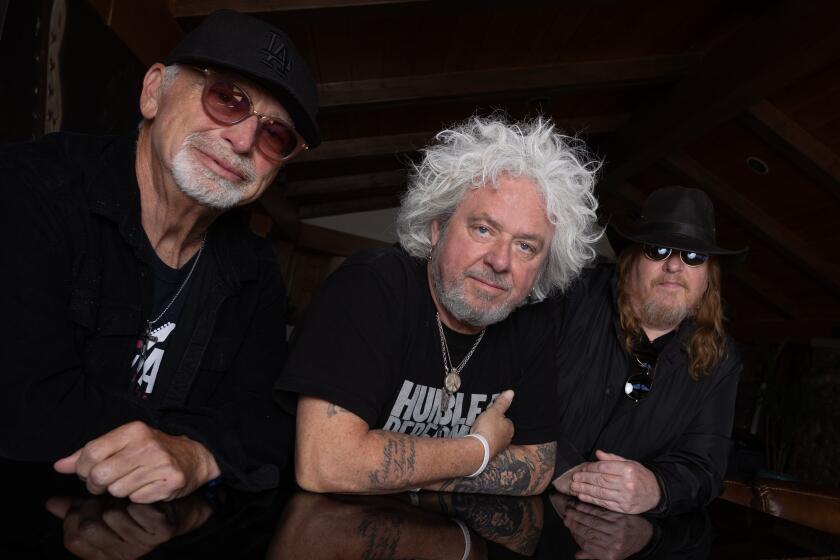Figure in Record Deal Tied to Crime Family
An individual who acted as a middleman in the recent sale by MCA Records of more than 3 million records and tapes on the so-called cutout market has been identified as a reputed organized crime figure in papers filed in U.S. District Court here.
Salvatore Pisello, 62, was sentenced Monday to two years in prison for tax evasion and failure to file federal tax returns. In documents filed with a sentencing memorandum, Pisello is described by law enforcement officials as a suspected international heroin trafficker and “an alleged high-ranking soldier in the Carlo Gambino crime family” of New York.
MCA said it had no prior knowledge of the circumstances leading to Pisello’s conviction and had cooperated in the Justice Department’s investigation.
Variety of Deals
The memorandum, written by Marvin L. Rudnick, a special attorney in the Los Angeles office of the Justice Department’s Organized Crime Strike Force, claimed that Pisello was paid a total of $250,000 by MCA Records in 1984 for a variety of business deals. But the document does not specifically say what, if anything, he was paid for the cutout sale.
The document states that, among other things, Pisello “arranged for MCA to sell two of his clients 60 truckloads of out-of-date record albums and cassettes worth $1.4 million.” According to the document, most of the records were ultimately delivered to Out of the Past Inc. in Upper Darby, Pa., a company owned by convicted record counterfeiter John La Monte.
Last month, The Times disclosed that a large number of counterfeit cassettes by MCA artists were being distributed to major record stores around the country under the guise that they were part of MCA’s cutout sale. (Record companies typically sell their slowest-selling records and tapes to cutout distributors, who then resell them to retailers as budget-priced items.)
Suspected Counterfeit Tapes
In the course of a two-week investigation, an MCA auditor and a Times reporter purchased suspected counterfeit cassettes of recordings by MCA artists at major record stores in the New York City area, Connecticut, New Jersey and at Los Angeles outlets of Licorice Pizza and Tower Records. The suspected counterfeits were of such well-known artists as Olivia Newton-John, Neil Diamond, Elton John, the Who and Tom Petty--artists whose work is almost never sold in the cutout market.
Los Angeles-based MCA turned over evidence of the counterfeiting operation to the Newark, N.J., office of the FBI and announced that it had ceased all further cutout sales pending the results of the investigation.
The Times uncovered no evidence that La Monte’s operation was involved in the manufacture of or knowingly sold any of the counterfeits.
In a statement issued Monday, an MCA spokesman said: “Sal Pisello is a representative of Sugar Hill Records, an independent record company that MCA distributes. Additionally, he represented a buyer who purchased records discontinued from the MCA catalogue. MCA had no prior knowledge of the circumstances leading to Mr. Pisello’s conviction.”
The spokesman added that “MCA has been in constant contact with the Justice Department during this investigation and has cooperated fully and will continue to do so.”
MCA took over the distribution of New Jersey-based Sugar Hill in 1983. According to the sentencing memorandum, Pisello brought the two companies together and in return received 3% of the net proceeds due Sugar Hill from MCA. Pisello “personally received $76,530 in 1984 from MCA in commissions on the Sugar Hill deal,” the memorandum states.
In another deal, MCA paid Pisello $30,000 in 1984 for “expenses involving his expertise in delivering a Latin music line” to the company and $50,000 in 1985 for “future income on the Sugar Hill deal.”
MCA executives would not say Monday who at the company negotiated the deals with Pisello.
During the sentencing hearing, U.S. District Judge Harry L. Hupp scolded Rudnick for including the allegations of Pisello’s organized crime involvement in the sentencing memorandum, saying they had no relevance to the tax charges. Pisello was convicted by a jury in March of failing to file federal income tax returns in 1978 and 1979, filing false tax information in 1976 and evading taxes on $210,000 of income from investors in his businesses.
Rudnick responded that Pisello has been mentioned in law enforcement data “for 20 years as being part of organized crime.”
Pisello refused to comment following his sentencing.
More to Read
The biggest entertainment stories
Get our big stories about Hollywood, film, television, music, arts, culture and more right in your inbox as soon as they publish.
You may occasionally receive promotional content from the Los Angeles Times.










